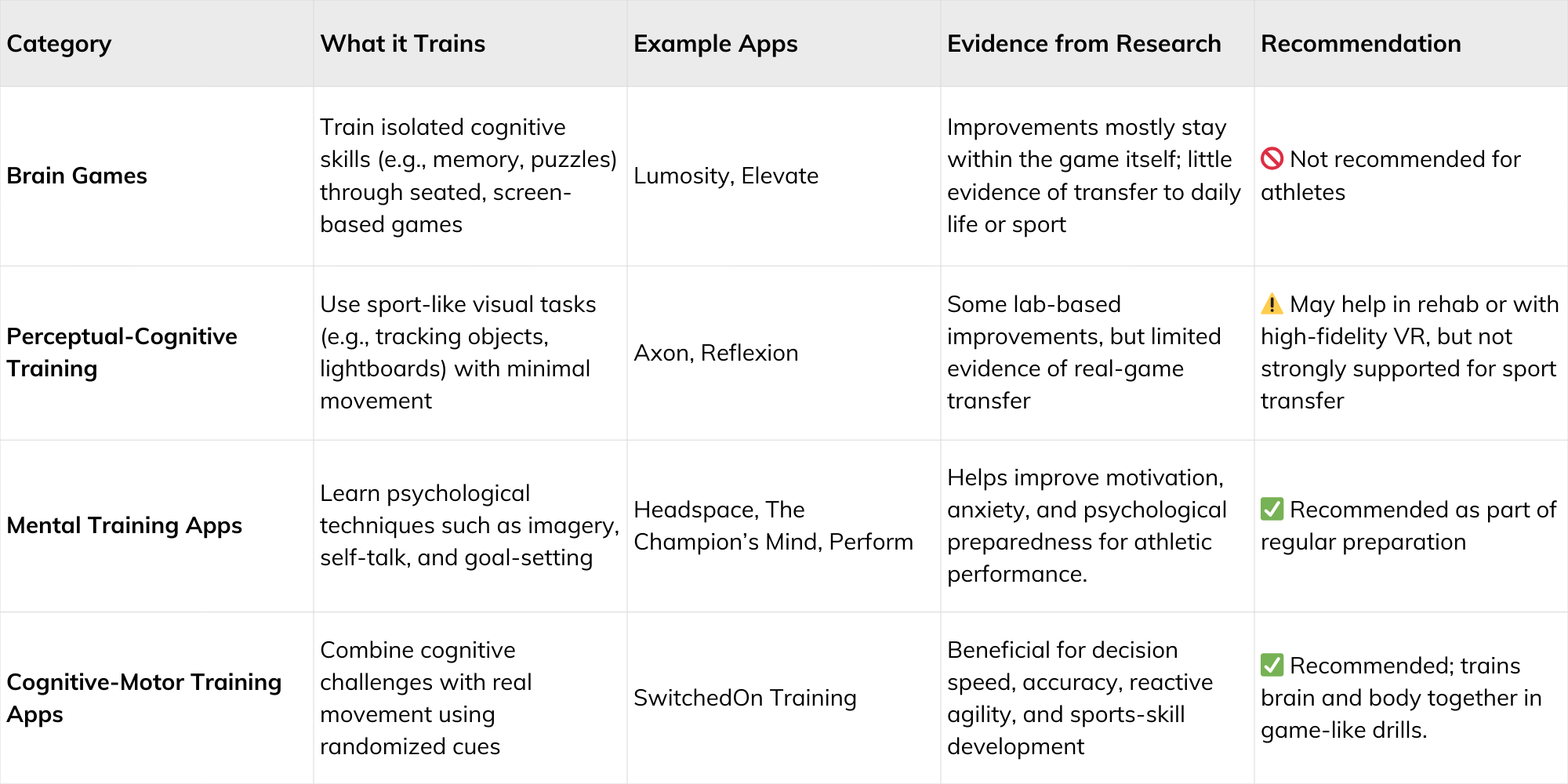Best Brain Training Apps for Athletes (and Which to Avoid)
Athletic performance depends on more than just physical ability. A growing body of research shows that the brain plays an important role in sports performance, with both cognitive functions (reaction time, decision-making, attentional control, etc.) and psychological skills (anxiety management, confidence, motivation, etc.) strongly linked to success on the field (Walton et al., 2018; Mahoney et al., 1987).
This evidence has fueled a surge in brain training apps for athletes, mobile tools designed to sharpen the mind and give players a competitive edge. The big question is: do brain training apps really work for athletes?
In this guide, we break down the four main categories of brain training apps for athletes, explain the science behind each, and provide clear recommendations on which are worth using.
Note: Like any training method, research is still developing. Effectiveness may vary depending on the individual and context.
Category 1: “Brain Games” (🚫 Not Recommended)
What they are
Brain games target general cognitive skills (e.g., memory, attention, problem-solving) through seated, screen-based games. They’re played while stationary (e.g., sitting at a desk or on the couch), often by tapping, swiping, or matching abstract shapes, numbers, or symbols.
Examples: Lumosity, Elevate
Why they’re not recommended
A meta-analysis by Sala et al. (2019) found that cognitive training helps you get better at the games you’re playing, but these improvements did not transfer to real-world performance.
Lumosity was fined $2 million by the FTC for deceptive claims that its games could enhance real-world performance and protect against decline (FTC, 2016).
The lack of sports-specific motor responses is a key criticism of the limited transfer effects on sports performance.
Category 2: Perceptual-Cognitive Training (⚠️ Less Recommended)
What they are
These apps or devices appear more relevant to athletes than traditional brain games, but the core activity still involves tapping on screens or reacting with minimal movement. They’re designed to have seemingly more sports-specific stimuli (e.g., tracking multiple balls on a screen), but they remain largely stationary and disconnected from real gameplay.
Examples: Axon, Reflexion
Why they’re less recommended
Much of their reputation stems from endorsements by high-profile athletes or teams, rather than strong scientific evidence.
A Meta-analysis by Zhu et al. (2024) found that perceptual-cognitive training improves lab performance, but real-game transfer is limited.
Similar to brain games, they are not grounded in sport-specific responses and lack ecological validity, limiting their transfer potential (Renshaw et al., 2019).
Where they might help
If you’re injured or unable to train physically, certain VR platforms with high cognitive fidelity (representative of real gameplay) may help maintain perceptual skills (Zhu et al., 2024). Still, lab improvements often outweigh real-game benefits.
Category 3: Mental Training Apps (✅ Recommended)
What they are
These apps train the psychological side of performance by teaching athletes skills like mindfulness, visualization/imagery, confidence scripts, and pre-performance routines. Most offer guided audio or video sessions that can be used daily or pre-competition.
Examples: Headspace (sport-specific meditation tracks), The Champion’s Mind (created by sports-psychologist Dr. Jim Afremow)
Why they’re recommended
A review of 30 systematic/meta-analytic reviews by Lange et al. (2023) found that ~90% of psychological skills training interventions (imagery, self-talk, goal-setting, relaxation, journaling, etc.) improved performance.
A study by Demeke et al. (2024) found that psychological skills training helped improve motivation, anxiety, and psychological preparedness for athletic performance.
While we couldn't find direct studies examining the example apps, the underlying methods appear to be evidence-based, low-cost, and transferable to sport.
Category 4: Cognitive-Motor Training Apps (✅ Recommended)
What they are:
These apps train cognitive and motor skills simultaneously by delivering randomized visual or auditory cues (e.g., colors, numbers, moving objects) that athletes must react to with sport-like movements. Instead of passively tapping a screen, users must perceive, decide, and react in one continuous loop, replicating the demands of real competition.
Example: SwitchedOn Training
Why they’re recommended
This approach addresses the biggest weakness of most brain-training tools: the absence of perception–action coupling. With cognitive-motor training apps, athletes are practicing decision-making while moving, just as they do in competition.
Research to date suggests cognitive-motor training may provide benefits including:
Faster, more accurate decisions → Decision speed improved by 5.4% and accuracy by 25.8% compared to traditional skill training (Lucia et al., 2023).
Enhanced cognitive function → Attention, working memory, and flexibility improved more than with brain games or aerobic exercise alone (Moreau et al., 2015).
Better sport performance transfer → Athletes achieved 17% greater gains in sport-specific performance tests vs. standard drills (Lucia et al., 2021).
Higher engagement → Training felt more effortful, enjoyable, and motivating than traditional sessions (Friebe et al., 2024).
In a study by Klatt et al. (2025), soccer players using the SwitchedOn app showed significantly greater improvements in reactive agility (with & without the ball), decision-making accuracy (in game-like tasks), and sprint speed while dribbling compared to standard training.
Comparison of Brain Training App Categories
Key Takeaways
🚫 Brain Games: Fun puzzles, but no evidence they transfer to sport performance.
⚠️ Perceptual-Cognitive Tools: Limited benefit; may help during injury recovery or in highly realistic VR settings, but real-game transfer is weak.
✅ Mental Training Apps (e.g., The Champion’s Mind): Can be used consistently to build psychological skills such as emotional control, confidence, and composure under pressure.
✅ Cognitive-Motor Training Apps (e.g., SwitchedOn): Can be used solo or with teammates to sharpen decision-making, reaction time, and sport-specific skills with greater transfer to competition.
Download the SwitchedOn app for free on iOS or Android using the buttons below.
MORE INFO AND RESOURCES
Scientific whitepaper on the neuroscience of athletic performance (learn more).
Online course on cognitive-motor training (learn more)

